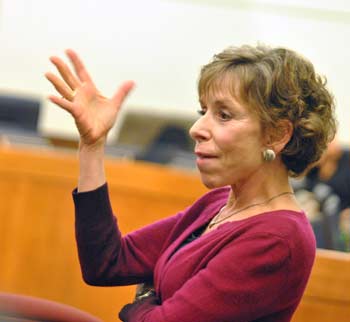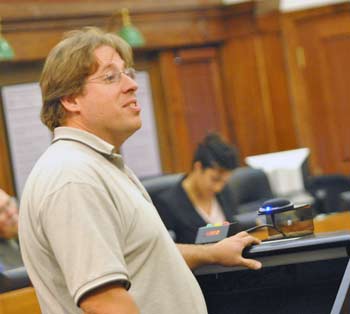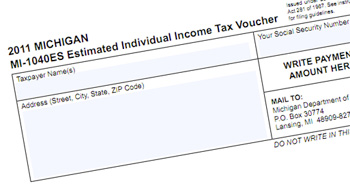County Board Debates Taxes, State Laws
Washtenaw County board of commissioners meeting (Oct. 16, 2013): A packed agenda and extensive public commentary resulted in a meeting lasting over six hours, with the majority of discussion focused on three issues: (1) the state’s Stand Your Ground law; (2) an increase to the Act 88 tax, and questions about the legality of such a levy; and (3) the county’s participation in a Pittsfield Township corridor improvement authority for State Street.

A supporter of Michigan’s Stand Your Ground law brought his gun to the Oct. 16 meeting of the Washtenaw County board of commissioners. (Photos by the writer.)
About three dozen people spoke to the board about the Stand Your Ground resolution, which urged the state legislature to repeal that law. Although there were speakers on both sides of the issue, more than 20 voiced opposition to the resolution, including several who attended the meeting wearing sidearms.
It was after midnight when the board took a 5-to-4 vote to pass the resolution, over dissent from Kent Martinez-Kratz (D-District 1), Dan Smith (R-District 2), Alicia Ping (R-District 3), and Rolland Sizemore Jr. (D-District 5). In support of the resolution were Felicia Brabec (D-District 4), Ronnie Peterson (D-District 6), Andy LaBarre (D-District 7), Yousef Rabhi (D-District 8) and Conan Smith (D-District 9).
The following week, David Raaflaub of Ypsilanti – a former candidate for county commissioner – filed a complaint against the board in the 22nd Circuit Court. The complaint asks the court to determine two issues: (1) what authority the board has that enables it to “draw conclusions of law,” and (2) what authority the board has to represent the county in seeking changes to state law. Dan Smith has indicated that he would bring forward a resolution to rescind the board’s Oct. 16 action, if it’s determined that the county will incur additional costs – such as fees for outside legal counsel – to defend the lawsuit.
Another major debate on Oct. 16 related to an increase in the Act 88 tax levy, which funds economic development and agriculture – including activities of Ann Arbor SPARK. The board ultimately gave initial approval to increase the tax from 0.06 mills to 0.07 mills, following a long discussion and a failed attempt by Conan Smith to increase the tax even more, to 0.09 mills. His proposal for a draft policy to guide the allocation of Act 88 funds did win support from the majority of commissioners, however.
The county’s position is that it’s authorized to collect the Act 88 millage – as well as a levy for veterans relief services – without seeking voter approval. That’s because the state legislation that enables the county to levy these taxes predates Michigan’s Headlee Amendment. During deliberations, Dan Smith raised questions about whether levying this kind of tax is constitutional. He also questions whether the language of the Act 88 statute allows the kind of general interpretation the county is using to define eligible uses of funds generated by the levy.
Dan Smith also proposed amendments for both the Act 88 and veterans relief millages in the future exempt them from capture by tax increment financing (TIF) districts or authorities in the county. Those exemptions, which were approved by the board, would apply to tax capture from a proposed State Street corridor improvement authority (CIA) in Pittsfield Township. After about 90 minutes of debate, the board gave initial approval to participate in that project, with Dan Smith casting the only dissenting vote. He had unsuccessfully proposed postponement, then floated an opt-out resolution that did not secure enough votes to pass. The board is expected to take a final vote on participating in the CIA at its Nov. 6 meeting.
In other action, the board (1) gave initial approval to a proposed brownfield redevelopment plan by the Chelsea Milling Co., makers of Jiffy Mix; (2) appointed Barb Fuller to the county road commission; (3) took an initial vote to extend the coordinated funding approach, which supports local nonprofits; and (4) authorized the annual apportionment report, with details of the 2013 taxable valuations for property in the county.
And in a vote taken after midnight, the board rejected a proposal that would have given notice to eliminate a lump-sum budgeting approach for Washtenaw County’s court system. That vote was 3-6, with support from only Dan Smith (R-District 2), Conan Smith (D-District 9) and Kent Martinez-Kratz (D-District 1). [Full Story]







